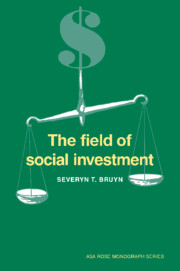Book contents
- Frontmatter
- Contents
- Preface
- Part I The idea of social investment
- Part II Social criteria and research
- Part III Global social investment
- 8 International investment
- 9 Social development in the Third World
- Epilogue: Social investment as a self-correcting movement in the market system
- Notes
- Bibliography
- Name index
- Subject index
- Title in the Series
9 - Social development in the Third World
Published online by Cambridge University Press: 19 January 2010
- Frontmatter
- Contents
- Preface
- Part I The idea of social investment
- Part II Social criteria and research
- Part III Global social investment
- 8 International investment
- 9 Social development in the Third World
- Epilogue: Social investment as a self-correcting movement in the market system
- Notes
- Bibliography
- Name index
- Subject index
- Title in the Series
Summary
The concept of social development is common to both capitalist and communist ideologies. We have defined it as the synergy that occurs in the cultivation of human and material resources together. Human resources include the individual's reserves of intelligence, intuition, sensitivity, imagination, and for our purposes, a capacity to learn technical knowledge, skills, and responsibilities needed for advanced states of economic development. It also includes the larger social domain, that is, a potential for institutions (e.g., courts) and organizations (e.g., schools) essential to the life of an advancing economy. Development means the cultivation of the personal and social resources of people so they can increase their capacity to work effectively in a more complex society. For social investors it means the formation of new patterns of social governance in the economic order of society.
Put another way, social development may be seen as the cultivation of a responsible use of power in the institutions of the economy. This means the unfolding of human potential among people governing economic organizations, the opening of inherent possibilities of social authority and responsibility among people working in the governing centers of the economy, and the creation of a new system of accountability of productivity for corporations. It involves the construction of a growth economy with a social foundation. To be successful, the process requires the expression of a new degree of human sensitivity for both the rich and the poor. This demands that creative action be taken by the rich in centers of power and by the poor in peripheral zones of the economy.
- Type
- Chapter
- Information
- The Field of Social Investment , pp. 200 - 221Publisher: Cambridge University PressPrint publication year: 1987



